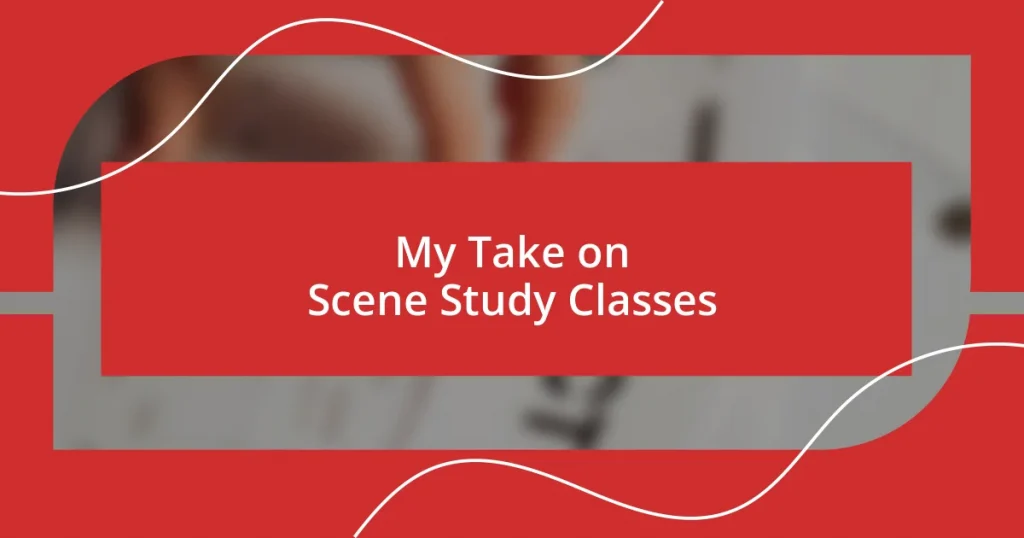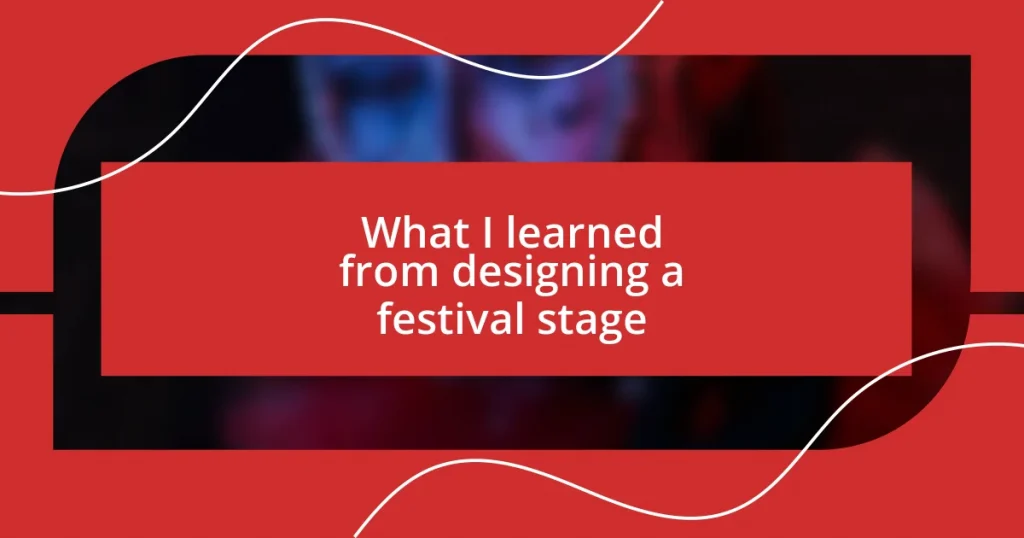Key takeaways:
- Scene study classes enhance acting skills through deep emotional exploration, character analysis, and a supportive environment that encourages risk-taking.
- Choosing challenging scenes and focusing on character objectives fosters personal growth and improves performance authenticity.
- Active engagement, collaboration, and constructive feedback are essential for maximizing learning and integrating skills into practice.
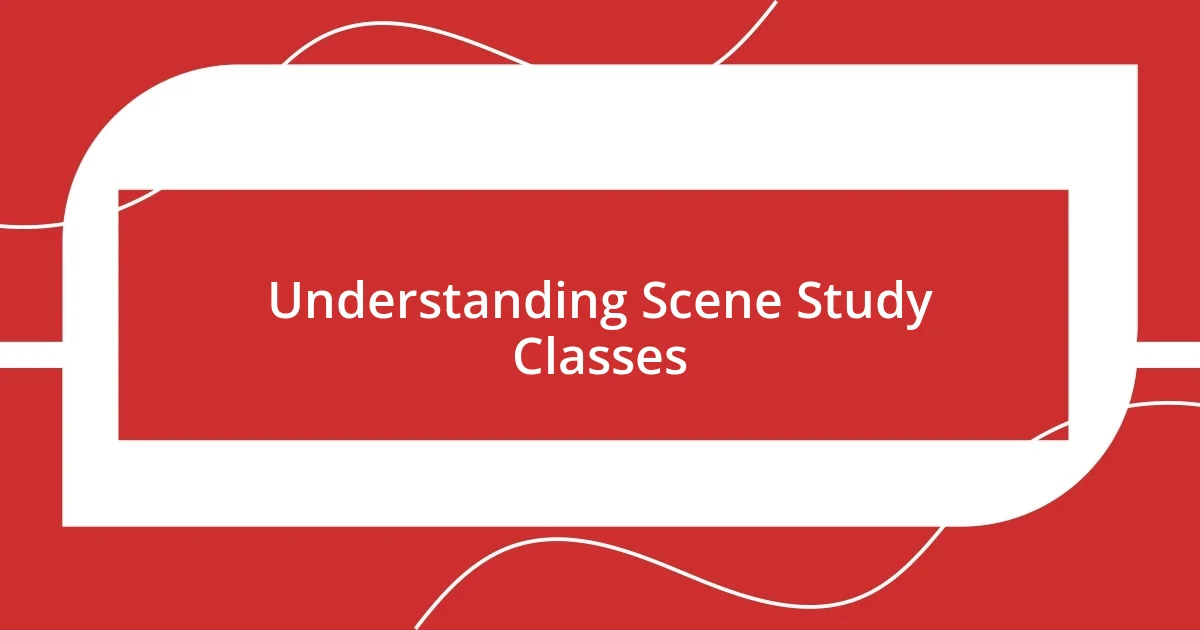
Understanding Scene Study Classes
Scene study classes are an essential part of an actor’s training, allowing participants to delve deeply into specific performances. I still remember my first scene study class; I was incredibly nervous, standing in front of my peers, but that experience pushed me to explore my character’s emotions like never before. The detailed feedback from my instructor turned those initial jitters into a powerful learning opportunity.
These classes often focus on dissecting scenes from plays or films, which helps students learn about subtext, emotional honesty, and character development. Have you ever felt the thrill of stepping into someone else’s shoes? I can tell you, that moment when I truly connected with a character’s struggle made me appreciate the art of storytelling in an entirely new way. It was as if the scene came alive around me, revealing hidden layers I had never noticed before.
In a supportive environment, actors can experiment and take risks without the fear of judgment, making scene study classes a safe space for growth. I remember once working on a particularly challenging scene; as I immersed myself, I found unexpected vulnerabilities surfacing. That push to explore my boundaries not only enhanced my skills but also deepened my emotional awareness, a takeaway that extends far beyond acting itself.
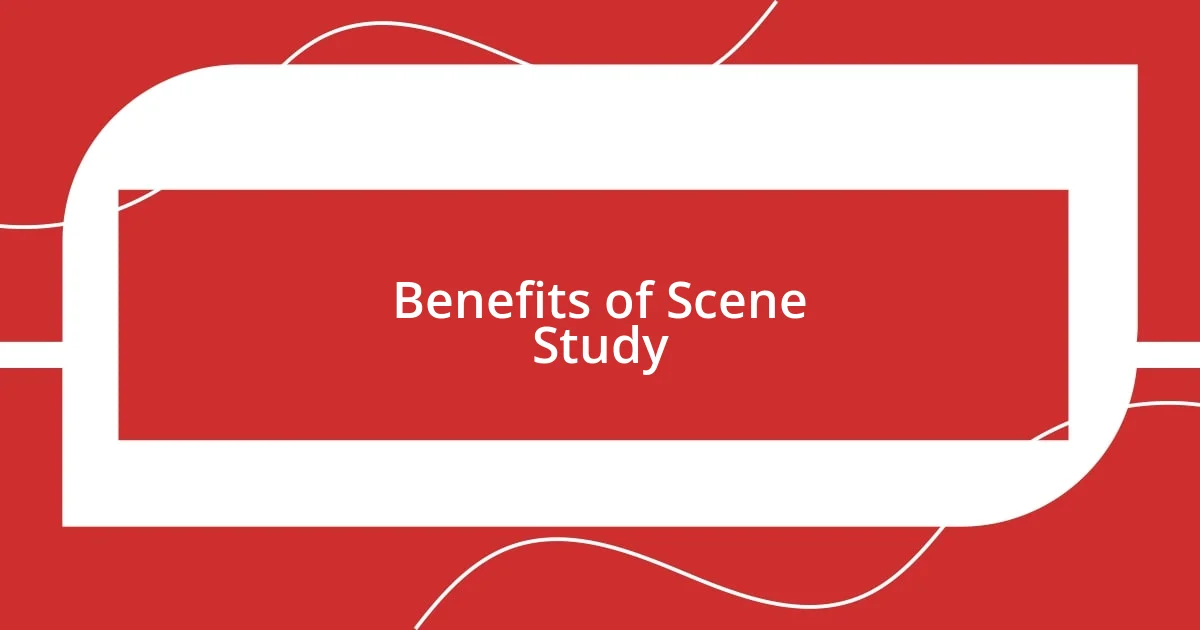
Benefits of Scene Study
Diving into scene study classes not only hones your craft but also nurtures a profound connection to yourself and your emotions. I’ve had moments where, while working on a scene, I unearthed feelings I hadn’t acknowledged in years, which allowed me to bring a raw authenticity to my performance. That emotional release transformed my approach, making each class feel like a mini therapy session that intertwined personal growth with artistic expression.
Here are some benefits of scene study classes:
- Emotional Depth: You learn to tap into your own emotions, making performances more relatable and genuine.
- Character Analysis: Dissecting various characters provides insight into human behavior, enriching both acting and interpersonal skills.
- Collaboration: Working with peers fosters a sense of community, where shared experiences lead to collective growth.
- Feedback: Constructive criticism helps refine your technique, enabling you to identify strengths and areas for improvement.
- Risk-Taking: A supportive atmosphere encourages you to explore new choices, helping to build confidence and versatility in performance.
I recall a time when I took a bold direction during a scene; the laughter and surprise from my classmates felt exhilarating. That experience reminded me how much freedom scene study can provide—it’s exhilarating to step outside your comfort zone and embrace the unexpected.
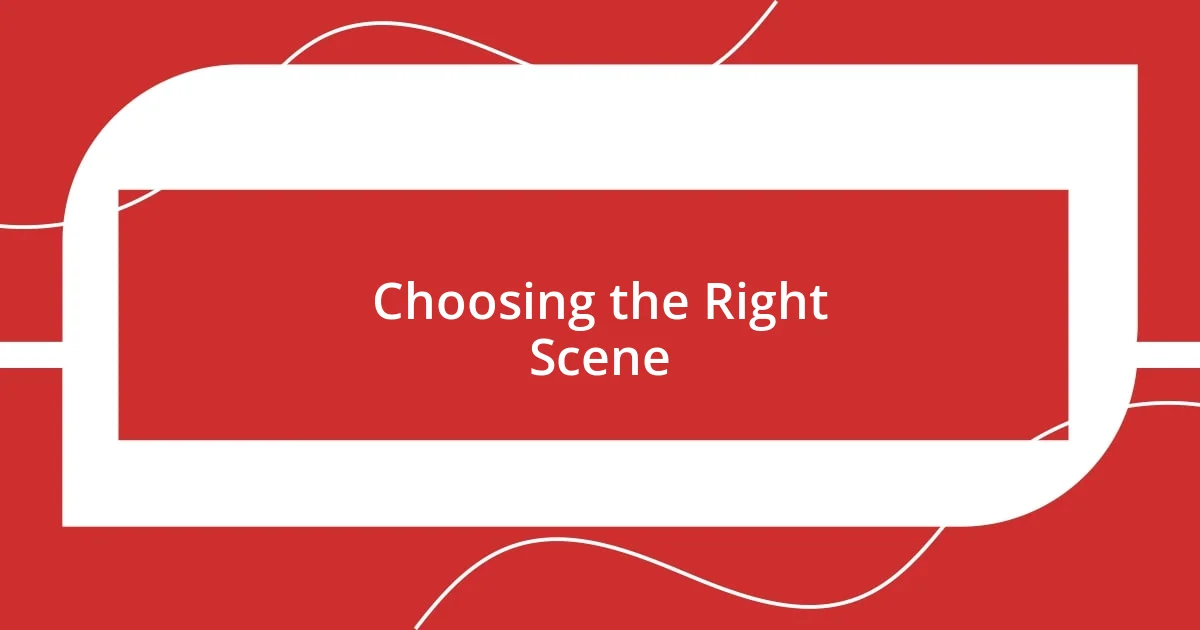
Choosing the Right Scene
Choosing the right scene for your study can significantly influence your growth as an actor. When I first started, I often chose scenes from plays I loved. However, I soon realized that selecting scenes that challenged my abilities—like those requiring vulnerability or high emotion—really propelled my development. It’s essential to think about what you want to explore; sometimes, the most uncomfortable choices can lead to the greatest breakthroughs.
Another important factor is the character’s journey within the scene. I remember tackling a scene where my character faced profound loss. The emotional weight initially seemed daunting, yet embracing it allowed me to connect with audience members on a deeper level. Consider scenes that resonate with you personally or push the limits of your emotional range. This will transform your performance from merely acting to a true connection with the audience.
Moreover, teamwork is vital in scene study classes, so consider how your scene’s dynamics will interact with your classmates. I once paired with a classmate for a complex duet; our contrasting energies elevated the scene to unexpected heights. Think of a scene that not only speaks to you individually but also invites collaboration. This synergy can enhance the learning experience and creativity.
| Criteria | Examples |
|---|---|
| Emotional Depth | Scenes involving grief, heartbreak |
| Complex Characters | Characters with flaws or transformations |
| Relatable Themes | Stories reflecting personal struggles or triumphs |
| Collaborative Potential | Scenes with multi-character dynamics |

Techniques for Effective Scene Study
When diving into scene study, one of the most impactful techniques is emotional preparation. I often find myself spending time before rehearsals reflecting on my own experiences related to the scene’s themes. Have you ever considered how personal connections to a character’s struggles can enhance your understanding? I remember working on a scene that revolved around betrayal. Channeling my own past experiences allowed me to embody my character fully, making the performance not only authentic but deeply moving.
Another vital technique is objectives and actions. Focusing on what your character wants in each moment can clarify their motivations and guide your choices. I’ve found that having a clear objective brings a powerful focus to a scene. When I played a character desperate for approval, I discovered how subtle shifts in my tone and body language could communicate that yearning. It made me realize how even the smallest choices can carry immense weight and depth.
Lastly, self-taping practices offer a unique opportunity to refine your technique outside of class. It’s essential to record yourself and analyze your performances. I often laugh at the quirks I notice in my recordings, such as nervous habits or unintentional expressions. What about you? Have you ever spotted something unexpected in your own work that led to a breakthrough? This self-reflection not only heightens my awareness but also pushes me to grow with each tape I review.

Common Mistakes to Avoid
One of the most common mistakes I see in scene study classes is not fully understanding the character’s intentions. I remember when I rushed into a scene, thinking I could wing it, only to realize later that without a clear grasp of what my character truly wanted, my performance fell flat. Have you ever felt like you were just reciting lines instead of living them? It’s vital to dig deep into the psychology of the character and their needs to create a compelling portrayal.
Another pitfall is over-relying on external expressions instead of internal emotions. Early in my training, I was so focused on nailing dramatic gestures that I overlooked the importance of what I was feeling inside. When I embraced vulnerability instead, everything changed. I discovered that genuine emotions resonate far more with an audience than flashy movements. How can we expect our audience to connect if we don’t let ourselves feel deep within?
Lastly, neglecting collaboration in group scenes is a mistake that can hinder growth. I once performed a complex scene without engaging with my scene partner, treating the moment as a solo act. The result was a disjointed performance that left both of us feeling unsatisfied. Have you ever found yourself so caught up in your performance that you forgot to listen? Real magic happens when you interact and respond to your classmates, creating a richer dynamic that can transform your scene entirely.
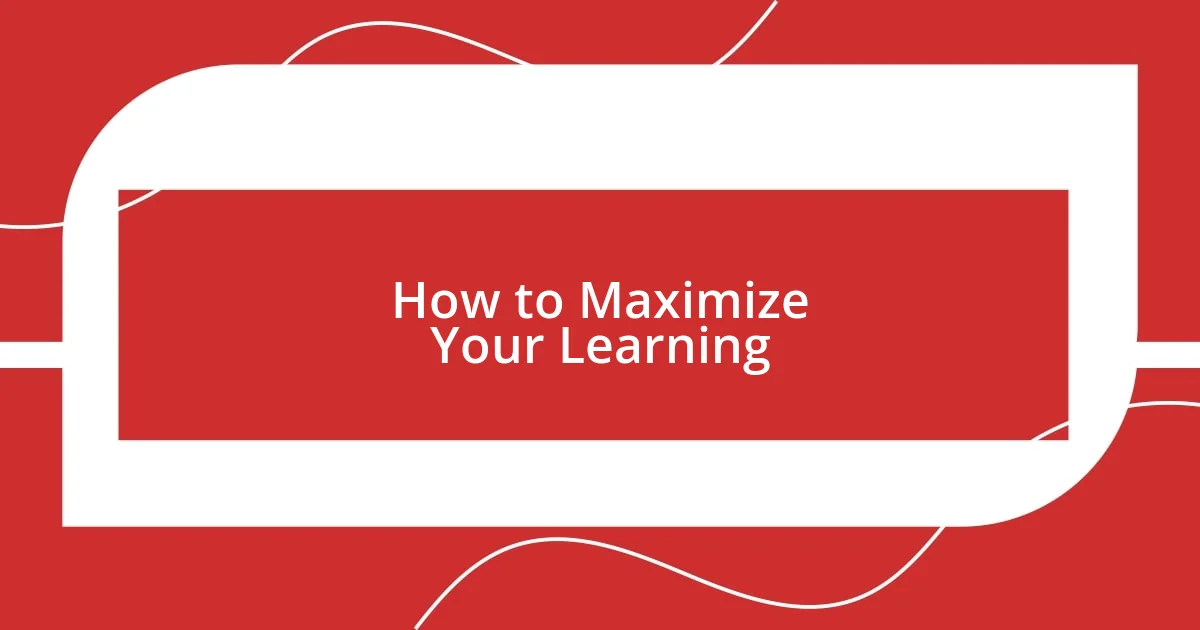
How to Maximize Your Learning
To truly maximize your learning in scene study classes, active engagement is key. I remember sitting in class, watching my peers perform, and instead of just observing, I started taking notes on not just their choices, but also the nuances in their performances. Have you ever realized that your own growth can stem from learning what resonates—or what doesn’t—through others? It’s a transformative process that deepens your understanding of character work.
Another way to enhance your learning experience is to push yourself beyond your comfort zone. I vividly recall choosing a scene that terrified me because it dealt with themes of deep loss. Initially, I was apprehensive, but embracing that challenge opened doors to new emotional depths I never knew existed within me. Can you think of a scene that made you feel vulnerable in a way that led to breakthroughs? It’s often when we step outside of what’s familiar that the real magic happens.
Lastly, don’t underestimate the power of feedback. In my experience, receiving constructive criticism after performances felt daunting, yet it paved the way for my growth. I remember a specific instance where a classmate pointed out my hesitation on stage, which I hadn’t even noticed. This insight transformed my approach, making me more aware of my pacing and presence. How often do we miss valuable feedback simply because we’re hesitant to ask for it? Embracing these moments not only fosters connection with classmates but also cultivates a deeper learning environment.
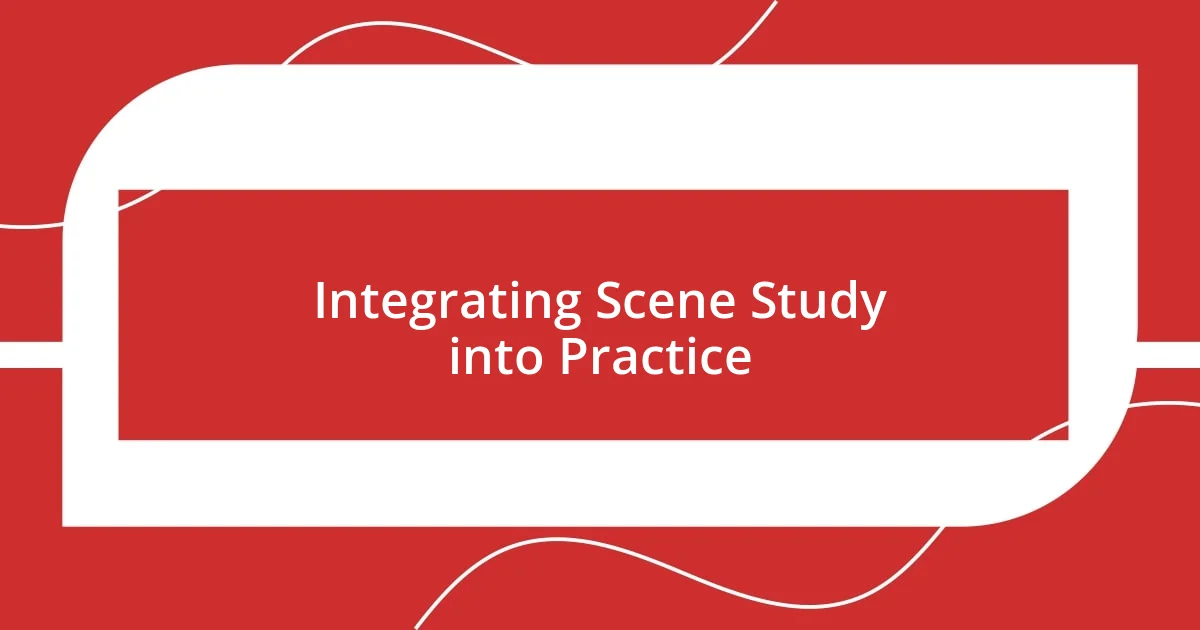
Integrating Scene Study into Practice
Integrating scene study into practice is about weaving what you learn into your daily acting routines. I recall a time when I started recording myself while performing scenes at home. Watching those videos was revealing; I noticed habits I didn’t recognize in the moment. Have you ever seen yourself act and felt like you were a different person? It’s a great tool for growth, helping to refine distinct choices and improve overall performances.
I’ve also found that rehearsing with a scene partner outside class can strengthen your understanding of the material. There was an instance when my friend and I met weekly, working on our scenes with fresh perspectives and techniques. The intimacy of that practice allowed us to explore character motivations in a new light. Isn’t it fascinating how collaboration can unlock hidden layers in your performances? Those moments turned our scenes into dynamic conversations rather than rehearsed lines.
Additionally, I believe the integration of improvisation into your practice can spark creativity. I remember dabbling in improv during warm-ups, and it tremendously influenced my scene study work. Suddenly, I felt liberated; the ability to think on my feet and respond authentically made performances feel alive. What if we approach our rehearsals with that playful spirit? Embracing spontaneity can lead to unexpected depths in our character portrayals, enriching our craft even further.










